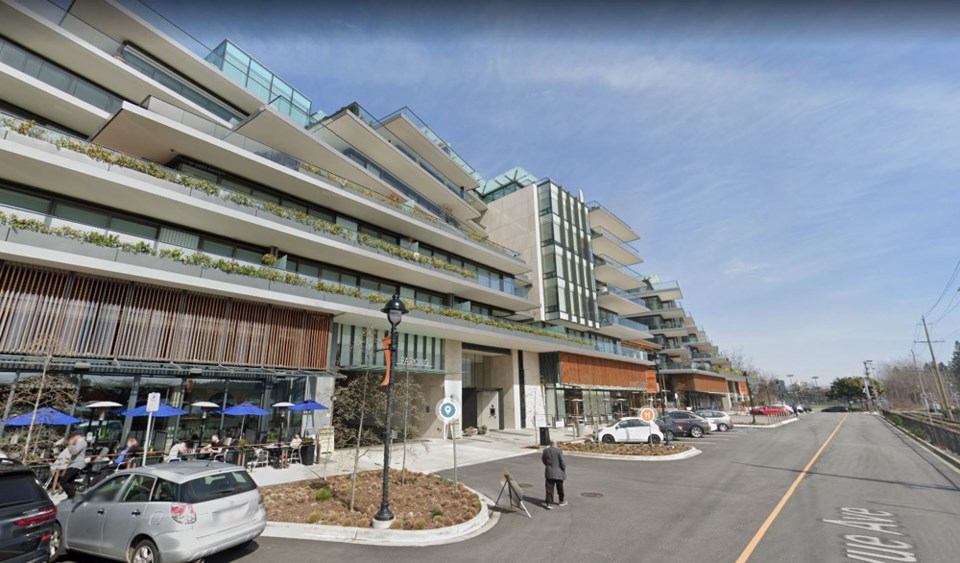A former tenant of West Vancouver’s Grosvenor building must pay her landlord almost $25,000, the BC Supreme Court has ruled, after breaking the lease and damaging the suite.
Mirela Resetar Sunjic signed a $3,400 per month, two-year lease with the owner of one of the suites in the Ambleside beach-side condo in late 2018, according to a court ruling released this week.
Throughout the tenancy, she complained to the landlord Vasuki Uthayakumar about the construction happening on Phase 2 of Grosvenor’s project, immediately next door, which she said resulted in health problems due to noise, dust, odours and a lack of privacy. Uthayakumar argued Sunjic was well aware of the construction when she signed the lease, “as it was plain to see” when she first visited the suite. But they agreed to reduce the rent by $200 per month, the ruling notes.
In February 2020, the tenant complained of water issues in the master bathroom and mould growing behind the vanity. The landlord attempted to send a contractor to fix the problem in March, but the tenant wouldn’t allow workers in, citing COVID-19 concerns. She moved out at the end of that month and cancelled her post-dated cheques, the ruling states.
Uthayakumar later had the bathroom problems fixed, which she argued were the result of “negligent use of the bathroom vanity and its water features” by the tenant, the court documents state. Additionally, the landlord alleged other damage to the suite, including a broken toilet seat, chipped countertop and missing microwave glass turntable. Uthayakumar kept Sunjic’s $1,700 damage deposit.
Sunjic applied to the residential tenancy branch for dispute resolution, requesting the return of double her damage deposit. Uthayakumar filed her own application, asking the branch to award her compensation for lost rent and damage to the suite.
After a 26-minute hearing in January 2021, the arbitrator ruled in favour of Sunjic on the damage deposit and awarded her $3,400 because the landlord had not done a move-out condition inspection report, which is required by the Residential Tenancy Act. As for the broken lease, the arbitrator ruled in favour of Uthayakumar, and ordered Sunjic to pay $17,510.
“While I accept that the tenant was unhappy with the level, frequency and extent of the noise and other side effects accompanying the neighbouring construction, based on the evidence, I find that the landlord addressed these complaints in a timely and reasonable manner, investigating issues and making accommodations where it was reasonable,” the arbitrator wrote at the time.
He also ordered Sunjic to pay an additional $7,424 to the landlord to cover the cost of repairs to the bathroom for a sum total of $24,934.
But, the residential tenancy branch staff made an error in uploading Sunjic’s documentary evidence for the arbitrator. Staff admitted it had inadvertently been included with the landlord’s evidence, the ruling notes.
Sunjic sought a review of the decision in light of that, but another arbitrator ruled against her after concluding all evidence was available for the branch to consider.
Sunjic then went to the B.C. Supreme Court seeking a judicial review, arguing she was denied procedural fairness at the January 2021 hearing because of the upload issue, and because she wasn’t given an opportunity to fully make her case or cross-examine the landlord’s assertions. She also argued the arbitrator’s decision was patently unreasonable because he had failed to consider all the relevant evidence.
B.C. Supreme Court Justice Shelley Fitzpatrick rejected those arguments.
“I cannot conclude that the tenant was denied procedural fairness here. The materials submitted by both parties were voluminous, being hundreds of pages, including detailed written materials outlining the arguments on both sides,” Fitzpatrick wrote.
Fitzpatrick added that residential tenancy branch procedure does not require long oral arguments or cross examinations.
“The arbitrator’s decision that only a brief hearing was required to supplement the written materials is consistent with the objective of the RTB process being ‘fair, efficient and consistent’ in its resolution of disputes between landlords and tenants,” she wrote.
When it came to the rulings on breaking the lease and money owed for damage, Fitzpatrick concluded the arbitrator sided with Uthayakumar.
“The plain reading of the decision is the arbitrator considered that evidence but, in the end result, he accepted the landlord’s evidence and rejected that of the tenant, as he was able to do. On this issue, again it is not the role of this court to re-weigh and reconsider the evidence toward finding a different result, as the tenant seeks to do,” she wrote. “Read as a whole, the decision is openly, clearly and imminently reasonable and rational.”
In closing, Fitzpatrick ordered Sunjic to pay Uthayakumar’s legal costs.



